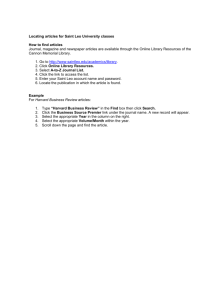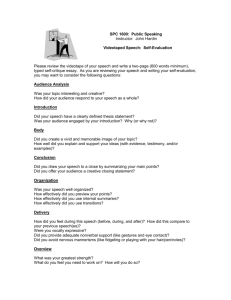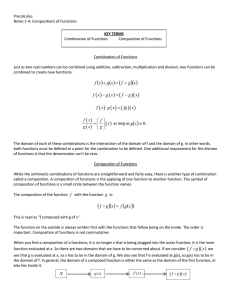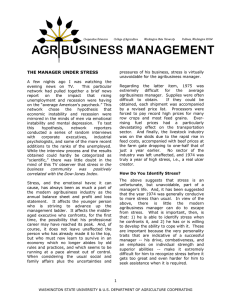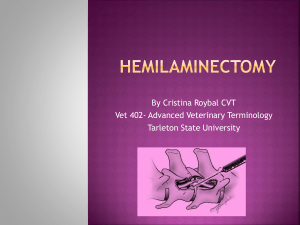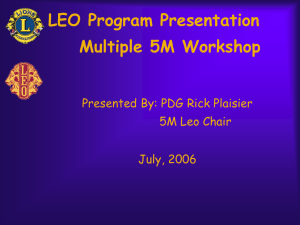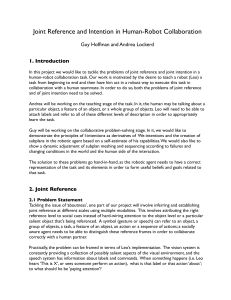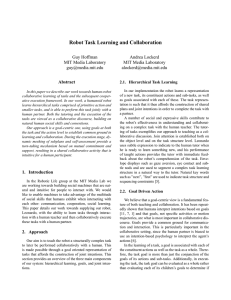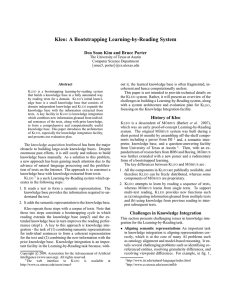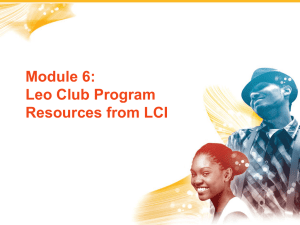St. Leo's College Transition Year Programme.
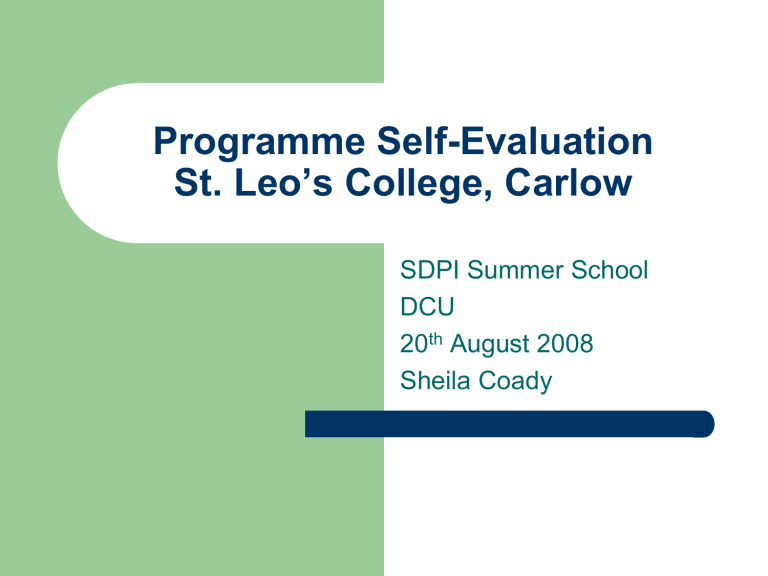
Programme Self-Evaluation
St. Leo’s College, Carlow
SDPI Summer School
DCU
20 th August 2008
Sheila Coady
Outline of presentation
Introduction
Overview of St. Leo’s College’s TY
Curriculum
Evaluation of Transition Year
St. Leo’s College’s experience
Evaluation templates (handout)
Conclusion
School based Student focused
Delivery
Design
Transition
Year
Curriculum
Assessment
Evaluation
Inspectorate
Monitor
DES Support
School context
All girls Voluntary Secondary School
Founded by Sisters of Mercy in 1839
Carlow Town
Comprehensive intake
900 students
77 teaching staff
Senior Cycle Programmes
– TYP, LCAP, LCVP, established LC
St. Leo’s College TY programme
Introduced in 1979 as a response to students’ needs
2 class groups in 1985
5 class groups in 2008/mixed ability
137 participating students
Optional
Approximately 80-85% uptake annually
External Evaluation in April 2002.
Programme Co-ordination
Programme Co-ordinator
T.Y. Co-ordinators
Activities Co-ordinators
T.Y. Year Head
Evaluation of Transition Year
Transition Year Guidelines 1994-95 Department of Education
"The programme should be regularly reviewed and evaluated internally by the co-ordinating team in close co-operation with school management, staff, students, parents, work providers and community interests. As part of this process, schools should attempt to develop appropriate quantitative and qualitative indicators as the means of raising and assuring the overall quality of the programme provided in the school. Regular monitoring and external evaluation of Transition Year will be a responsibility of the Department's inspectorate and psychological service."
Evaluating the Transition Year Programme
What is evaluation ?
The process of determining the quality of the service offered to students and charting ways to improve that service.
Transition News No. 7 1997
Why should a school evaluate its
Transition Year programme ?
Mandatory part of “Writing the TY Programme”
Affirmation of staff
Data for co-ordinator and core team
Transition Year programme improvement
Diagnosis of student problems
Diagnosis of staff difficulties
Planning for the year ahead
Support for administrative decision-making
Public relations
Data available for external evaluation by the Inspectorate
What might be evaluated ?
Overall effectiveness of the programme
Relevance of original goals of the TYP
Breadth and balance within the programme
Teachers' levels of satisfaction with their modules/subjects
Application of active learning approaches
Learning resources
Student induction programme
Allocation of resources
Communication flows
What might be evaluated ? Cont’d
Students' progress and motivation
Communication with parents
Assessment procedures
Image of the programme
Use of external learning environments
Links with employers
Community connections
Staff co-operation and teamwork
Decision making procedures
Who might be involved ?
Co-ordinator and core team
Teachers of Transition Year students
The whole staff
Employers providing work experience
Other ‘community' interests
Students
Parents
When might it take place?
Weekly
End of Module/Course
During/after Work Experience
Following a specific event
End of term
Parents Night
Towards end of school year
St. Leo’s College Evaluation of TY
Whole staff programme evaluation
–
–
External evaluation report 2002
Re-writing of TY programme in line with “Writing the Transition Year Programme” (SDP 2003-
2004). Carried out by subject departments with internal facilitation
– Meeting of all TY teachers chaired by TY coordinators
Outcomes of TY programme evaluation
Updated written Transition Year Programme
–
–
Introduction to programme
Discrete subject programmes
Improved effectiveness of the programme
Assessment procedures further developed
– Project work, Student self-assessment
Wider certification
Community links and external learning environments
Formal and frequent communication with parents
TY graduation night (format developed)
Ongoing TY curriculum evaluation
Ongoing TY curriculum evaluation
Subject departments, teachers, students, external partners
Calendar layer
– Evaluation of musical, work experience
TY specific/modular layer
– Evaluation of Social Skills programme/KAS, Young Social
Innovator
Subject sampling layer
– Evaluation of French, German, Art & Heritage
Core subject layer
– Evaluation of RE and Maths
Evaluation Instruments
Students
– Specific event evaluation
–
–
–
Individual subject evaluation
Mid-year self-evaluation
End of year evaluation
Teachers
–
–
–
Evaluation of teaching styles
Subject/module evaluation
Self-evaluation
Parents
– End of year evaluation
Developed by TYCSS and adapted by subject departments and individual teachers
Role of co-ordination team in programme evaluation
Initiates and manages the evaluation process
Selects areas of programme to be evaluated
Defines success criteria
Assists in the provision of evaluation templates
Collation, analysis and interpretation of data
Extracting recommendations
Negotiating and implementing changes
Benefits of TY programme selfevaluation
School culture of self-improvement
Further promotion of collaboration/collegiality
Whole school ownership of and commitment to the Transition Year Programme
Improvement in aspects of programme planning, delivery and management
Enhanced teaching and learning
Benefits of TY programme selfevaluation
Increased programme coherence and clarity of purpose
Utilisation of in-school expertise
Provision of structures for listening to staff, pupil and parent needs
Generates confidence in relation to external evaluation/WSE
